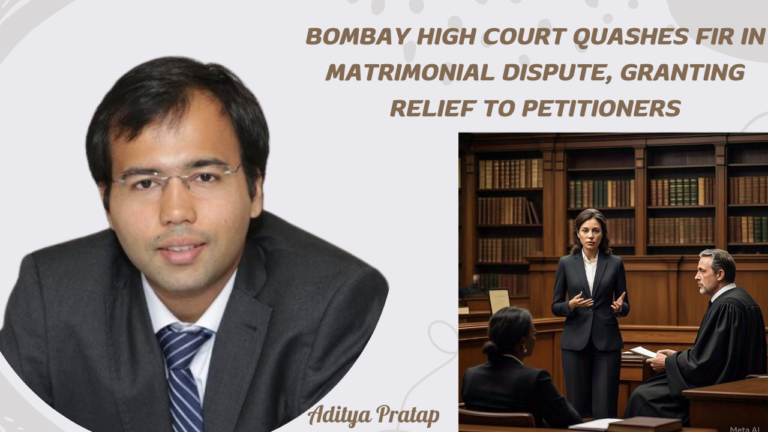
Advocates Abha Singh and Aditya Pratap Secure Quashing of FIR in High-Profile Matrimonial Dispute
Advocates Abha Singh and Aditya Pratap represented the Petitioners in a significant decision by the Hon’ble Bombay High Court, granting relief to the Petitioners in a Criminal Writ Petition by quashing FIR No. XXXX, which was filed under Sections 498-A, 406, 404, 506 read with 34 of the IPC. The case involved allegations of matrimonial cruelty, dowry harassment, and disputes between the complainant wife and the family of her estranged husband. Advocates Abha Singh and Aditya Pratap effectively argued for the Petitioners.
Case Background
The case stemmed from a complaint filed by the estranged wife against her husband, his parents, siblings, and their spouses. The allegations included physical and emotional abuse, dowry demands, financial coercion, and the taking away of her personal belongings, including “streedhan” (gold ornaments). The Petitioners argued that the FIR was filed maliciously after mutual consent divorce terms had already been agreed upon and approved by the Family Court.
The complainant and her husband were married in 2007. Due to marital discord, the couple separated in 2013, eventually filing for mutual divorce in 2014. As part of the consent terms, the husband agreed to return the complainant’s belongings and provide a monetary settlement. Despite these terms, the complainant filed the disputed FIR in February 2015, alleging abuse and harassment that predated the settlement.
Key Arguments by Advocate Abha Singh
Advocate Abha Singh, representing the Petitioners, presented a compelling case. She argued that the FIR was a calculated misuse of the legal system aimed at harassing her clients. Key points raised included:
Advocate Singh pointed out that the complainant had accepted the return of her belongings and a settlement amount of ₹1,00,000 as part of the mutual divorce terms. This was documented in the Family Court’s decree. The filing of an FIR after such a settlement clearly indicated bad faith and an intention to coerce the Petitioners further.
The FIR was lodged months after the settlement in the Family Court, despite the complainant having detailed her grievances in the court proceedings.
She further highlighted the generalized nature of the allegations against the Petitioners, particularly the other family members of the husband. She argued that there was no substantial evidence to support these claims, which were likely fabricated to exert undue pressure on the primary accused.
Citing several Supreme Court judgments, including Achin Gupta v. State of Haryana and Geeta Mehrotra v. State of Uttar Pradesh, Advocate Abha Singh emphasized that criminal proceedings should not be allowed to proceed if they constitute an abuse of the judicial process. She contended that the case fell squarely within the ambit of such misuse.
Arguments by Advocate Aditya Pratap
Advocate Aditya Pratap supported the submissions made by Advocate Abha Singh and added further depth to the arguments:
Advocate Pratap underscored the plight of the husband’s parents, siblings, and their spouses, who were unnecessarily dragged into the dispute. He argued that such baseless allegations against family members not only tarnished their reputations but also wasted judicial resources.
He further emphasized the sanctity of the mutual consent divorce terms. He argued that allowing the FIR to stand would undermine the purpose of mutual settlements, discouraging parties from resolving disputes amicably.
Advocate Pratap also highlighted the broader implications of such cases on the judicial system. He urged the Court to send a strong message against frivolous litigation, which hampers genuine grievances from receiving timely justice.
Contentions of the Opposite Party
The complainant’s/Respondent’s perspective, as reflected in the FIR and the arguments presented by the State’s counsel, revolved around claims of harassment and financial exploitation. Key contentions included:
The complainant/Respondent accused the Petitioners, particularly her husband and in-laws, of pressuring her to bring money from her parents for purchasing a flat. She claimed that these demands were made repeatedly, leading to emotional and financial distress.
The FIR detailed incidents of physical and emotional abuse, including allegations that the husband refused to provide her food, assaulted her, and took away her salary.
The complainant/Respondent alleged that her jewellery and other belongings were taken by the Petitioners, despite these items being listed and returned during the divorce settlement.
The complainant/Respondent argued that the settlement agreement was coerced, and the terms did not absolve the Petitioners of their culpability for past misconduct.
Court’s Observations
The Hon’ble Bombay High Court meticulously examined the evidence and submissions. The Hon’ble High Court noted several inconsistencies in the complainant’s actions:
- The complainant/Respondent did not disclose the FIR during the Family Court proceedings, despite its filing before the divorce decree.
- The acceptance of a monetary settlement and the return of belongings contradicted the allegations in the FIR.
- Allegations made against the sisters of the Petitioner No.1 and their spouses were found to be vague and unsupported by evidence.
In its judgment, the Hon’ble Court stated that allowing the criminal proceedings to proceed for an offense under Section 498A, etc., of the IPC would surely constitute an abuse of process of law.
Relief Granted
The Hon’ble Court observed that the allegations in the complaint regarding cruelty inflicted upon her by the Petitioners, including taking away her streedhan and other allegations, were not sustainable in law, especially in light of the Decree of divorce by mutual consent. It appeared that the filing of the criminal complaint post-filing of consent terms in the Family Court was a pressure tactic employed by the complainant against her husband and his family members, including the spouses of her sisters-in-law. This clearly constituted an abuse of the process of law and was liable to be quashed in its totality.
Therefore, the Hon’ble Court quashed FIR No. XXXX, providing significant relief to the Petitioners. The judgment reaffirmed the principle that legal provisions intended to protect vulnerable individuals must not be misused as tools of harassment.

About the Author
Aditya Pratap is a practicing lawyer and founder of Aditya Pratap Law Offices based in Mumbai. An alumnus of NALSAR University of Law, Hyderabad, he has over 11 years of experience and has handled numerous cases of public and private significance. For more insights, you can visit his website: adityapratp.in. Watch him in TV interviews.